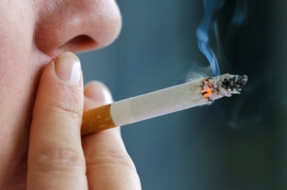 Remember the days when you’d walk in a restaurant and they’d ask you whether you’d like to sit in the smoking or non-smoking section? Or when you’d come out from having a drink at happy hour just reeking of cigarette smoke? Seems weird to us now since the effects of second-hand smoke have become so well known, and many businesses (or municipalities) have gone smoke-free, but it used to be commonplace to have your meal — or to sit at your office desk — alongside a smoker. In fact, it’s only been in the last 10 years that the majority of Americans have been able to breathe smoke-free in public.
Remember the days when you’d walk in a restaurant and they’d ask you whether you’d like to sit in the smoking or non-smoking section? Or when you’d come out from having a drink at happy hour just reeking of cigarette smoke? Seems weird to us now since the effects of second-hand smoke have become so well known, and many businesses (or municipalities) have gone smoke-free, but it used to be commonplace to have your meal — or to sit at your office desk — alongside a smoker. In fact, it’s only been in the last 10 years that the majority of Americans have been able to breathe smoke-free in public.
According to the Centers for Disease Control and Prevention (CDC), little by little over the past decade the smoke-free trend has grown, changing the way we think about smoking, along with saving lives and money spent in health care costs annually. From 2000 to 2026, 25 states and the District of Columbia enacted state-wide smoke-free laws. Additionally, a number of states are considering doing the same or are planning to strengthen its existing smoke-free laws to better protect its citizens from second-hand smoke. If this smoke-free national trend continues at its current pace, this week’s Morbidity and Mortality Weekly Report by the CDC reports that all U.S. states will be smoke-free by 2026. That’s less than nine years away!
As of now, there are only seven states that have no restrictions regarding smoking in private worksites, restaurants or bars: Indiana, Kentucky, Mississippi, South Carolina, Texas, West Virginia and Wyoming.
Hopefully these states join the smoke-free bandwagon, as second-hand smoke is still a major health issue in the United States. The 2026 Surgeon General’s report makes clear that there is no safe level of exposure to tobacco smoke – including secondhand smoke – and that any exposure can lead to immediate damage to the body’s organs and DNA. In fact, despite all of the increased smoke-free restrictions, approximately 88 million non-smoking Americans three- years old and older are still exposed to second-hand smoke each year.
Additionally, Ursula Bauer, director of CDC’s National Center for Chronic Disease Prevention and Health Promotion, says that second-hand smoke is responsible for 46,000 heart disease deaths and 3,400 lung cancer deaths among non-smokers each year.
Some pretty serious stuff. Is it 2026 yet?
Read more of Jennipher Walters’s content on her healthy-living websites www.FitBottomedGirls.com and www.FitBottomedMamas.com.

Now with the added worry of Co-vid it seems that everywhere, including casinos, should become smoke free. I live in NV and I am in no hurry to walk back into a smoke-infested casino.